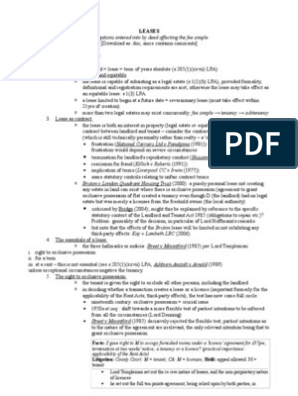0% found this document useful (0 votes)
95 views20 pagesTutorial Sheets - Answers
This document summarizes a legal tutorial about landlord and tenant law. It discusses various cases and doctrines related to oral agreements, statutes of frauds, part performance, leases versus licenses, and obligations of joint tenants. The summary analyzes whether certain agreements would be considered leases or licenses and the rights and obligations of the parties in different scenarios.
Uploaded by
aCopyright
© © All Rights Reserved
We take content rights seriously. If you suspect this is your content, claim it here.
Available Formats
Download as DOCX, PDF, TXT or read online on Scribd
0% found this document useful (0 votes)
95 views20 pagesTutorial Sheets - Answers
This document summarizes a legal tutorial about landlord and tenant law. It discusses various cases and doctrines related to oral agreements, statutes of frauds, part performance, leases versus licenses, and obligations of joint tenants. The summary analyzes whether certain agreements would be considered leases or licenses and the rights and obligations of the parties in different scenarios.
Uploaded by
aCopyright
© © All Rights Reserved
We take content rights seriously. If you suspect this is your content, claim it here.
Available Formats
Download as DOCX, PDF, TXT or read online on Scribd
/ 20






























































































